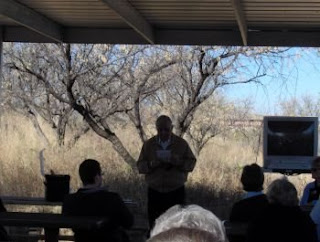
Well since last week I talked about my experience at the St. Andrews Children's Clinic and what I remembered most about it, this week I thought I would look at how Executive Director Ted Estrada helps the clinic run, getting donations and trying to keep afloat in an economy that is struggling.
During our sit down interview with Estrada, which can be viewed on the Borderbeat website within the next week or so, we asked him how the clinic goes about getting donations, why he chose to work in the medical field and what the future holds for the clinic.
When talking about where the clinic gets its donations from Estrada talked about the generosity of the people who volunteer at the clinic once a month. He said some donate just a few dollars and some go as far as donating thousands of dollars.
When talking about some of the people who have donated money since he became executive director back in May he said, "I've always said that these are retired persons. To sit down and write a check for three dollars, for $50, $100, or $50,000 like we have received, you have to be motivated by something." He asked us both before we entered into the clinic and during our interview with him to find out why people volunteer at the clinic and see what reasons they give.
Estrada's work in the health care field is an interesting one because of his background and where he came from to where he is right now. He said he grew up wanting to be a doctor but growing up in Texas in a large family that he described as being poor. He worked his way through college going to the University of Texas-Austin. While there he took some anatomy classes and had a rather interesting beginning to his desire to enter the health care field.
"I took a couple of anatomy courses and I fainted at one of them," Estrada said. "But it appealed to me after awhile not so much as a practitioner but more of an administrator."
When working as a hospital administrator in California, Estrada said he used to tell his employees that his job was like "running a small city."
As for the future of the clinic, Estrada hopes that instead of using the church as the site for the clinic a new building could be used specifically for the clinic. He also hopes that maybe there would be a time where two or three doctors could be permanently employed by the clinic so that children who come to the clinic over the year or longer would be able to see the same doctor.

I'll stop here for now because I don't want to give away the rest of the story just yet. But be sure to visit the Borderbeat website to read and view the video of our interview with Estrada.
No comments:
Post a Comment